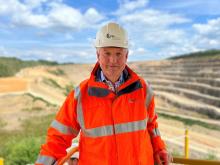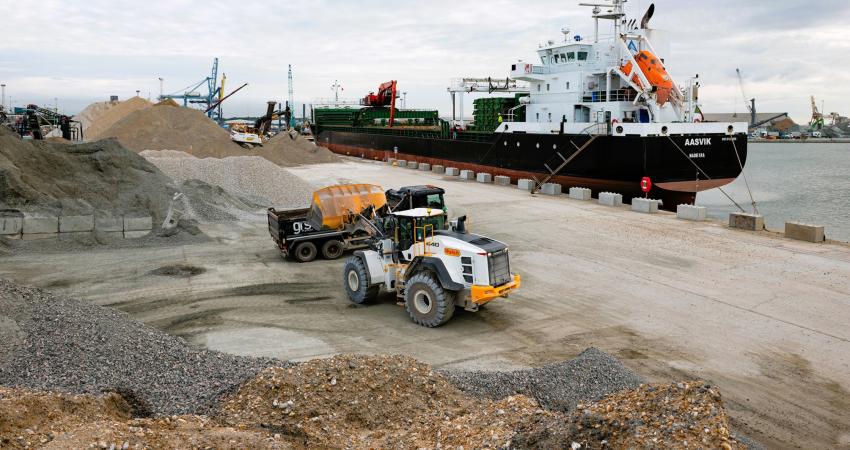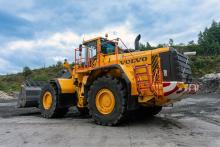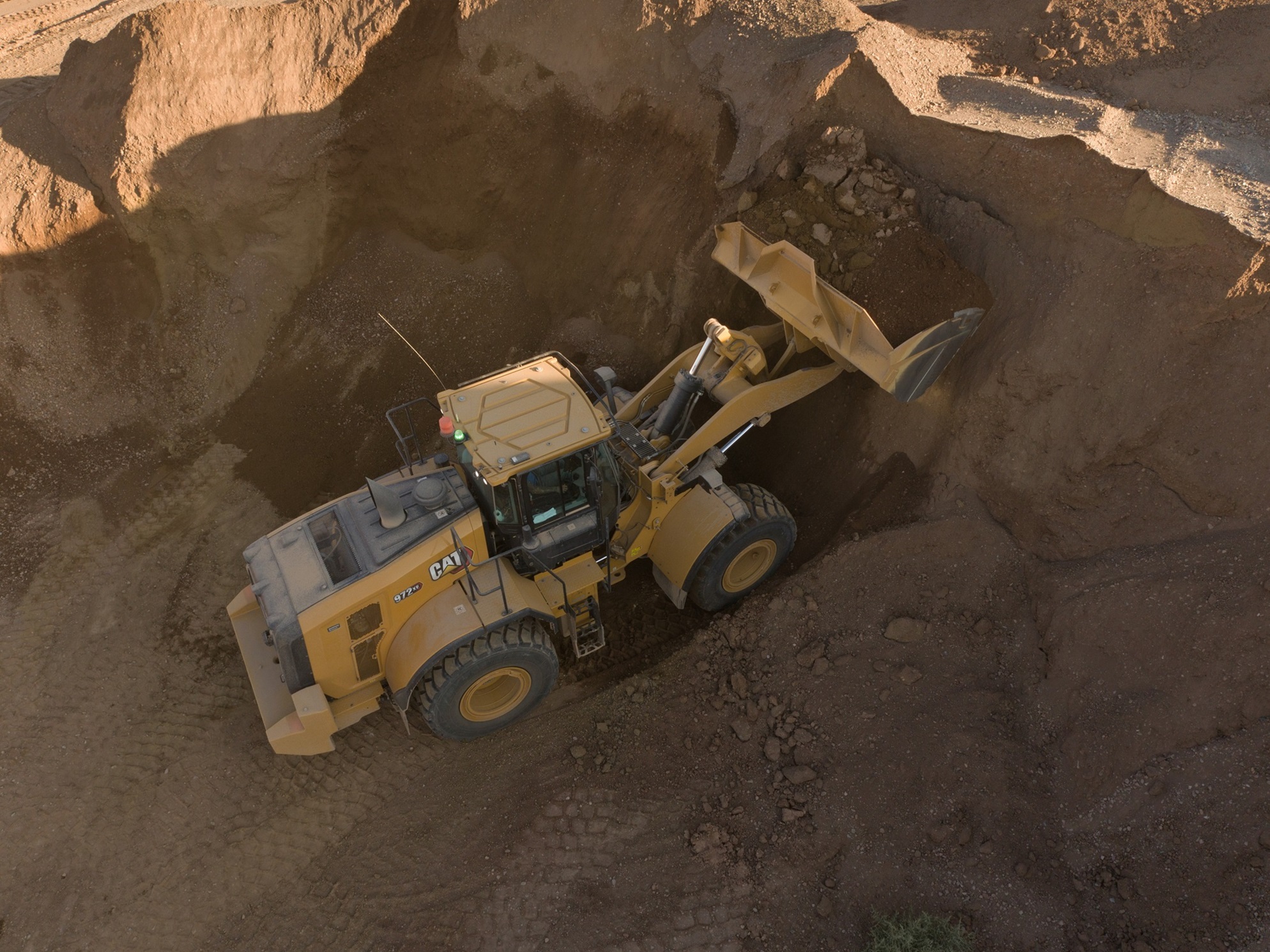
The Mineral Products Association (MPA) has published a new regional construction and mineral products markets report, giving a detailed assessment of historical, current and future trends across every region of Great Britain.
Primarily prepared to help inform and support the local mineral planning system, the annual report compiles industry data and broader context to paint a clear picture of the main drivers of activity in heavy-side construction materials and industrial minerals, an essential tool for producers and planners alike.
The report includes summaries for all regions and devolved administrations in Great Britain, illustrating the recent performance of the construction and mineral products markets, with critical insight into the sectors expected to drive growth in the UK's around 280 million tonnes a year (Aggregates Europe – UEPG 2021 estimate) mineral product demand over the next five years (2023-27).
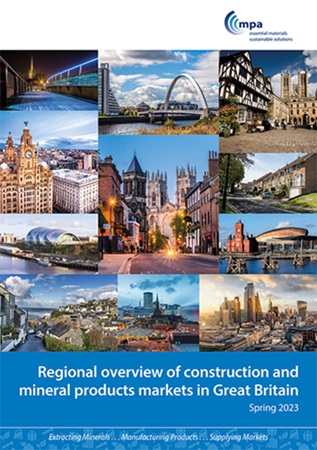
While London is often regarded as the key hub of new construction projects and infrastructure, representing 21% of the total value of construction output in 2022, the report highlights that the East of England and Yorkshire and the Humber are both expected to see the fastest rate of growth (2.2%) over the next five years, led by energy-related projects.
Data on mineral product sales volumes is collected through a rigorous survey among MPA producer members, who comprise most mineral products markets, including 90% of total GB market sales for primary aggregates and asphalt, for example, and 75% for ready-mixed concrete.
The report reveals that construction demand for mineral products in 2022 recorded a gradual loss in momentum as the year progressed due to a worsening macroeconomic environment and slowing activity in key construction segments. Tonnages of primary aggregate sales fell by 8.2% annually compared to 2021, asphalt by 6.5%, and ready-mixed concrete by 3.8%.
The East Midlands was the biggest asphalt and crushed rock market in 2022, accounting for 15% and 29% of total sales in Great Britain, respectively. The region also emerged as the most resilient to the downturn last year, recording the smallest falls in demand.
Meanwhile, London was the biggest demand centre for ready-mixed concrete, accounting for 19% of total sales volumes from fixed plants. Demand in London last year remained broadly flat, in contrast to the 5.5% decline recorded at a national level.
Finally, much of the sand and gravel used in Great Britain to manufacture ready-mixed concrete is produced from the West Midlands, the East of England and the South East, accounting for 53% of total sand and gravel sales in 2022.
Luke George, economist at MPA and author of the report, said: "This new report provides a valuable insight into the contrasting dynamics in construction and mineral products markets across the various regional and devolved administrations of Great Britain. We aim to provide a unique, easy-to-use point of reference to support MPA members, planning professionals and other industry experts in their decision-making processes. This report cuts through the overwhelming quantity of industry data that's available and revised almost daily."

"Minerals and the wide range of construction products derived from them are key elements to successfully delivering many of the Government's ambitious policy objectives, such as on housing and infrastructure, including achieving the energy transition and delivering Net Zero. The UK economy's success in delivering on these objectives will depend on local mineral planning authorities and mineral producers having robust evidence around future market needs, given delivery is heavily reliant on the availability and supply of essential mineral products."
Mick Knight, industry manager – Quarry and Aggregates for Finning UK & Ireland, Caterpillar's UK and Ireland dealer, says quarry operators, especially larger companies, are increasingly focused on meeting their net zero emissions goals.
"We can do a lot now to drive best practices and make sites and operators more efficient to reduce fuel use and carbon emissions. For example, using telemetry to connect equipment, operators, and sites has produced significant gains."
Knight explains that while machine technology is widely used in the aggregates and quarrying sector, there is huge scope to increase the use of telemetry as well as semi-autonomous technology, such as Cat Command, and other features in the use of machines to provide greater productivity, efficiencies and ensure operator safety.
"Better use of telemetry on the machines can significantly improve site productivity and play a pivotal role in ensuring machine performance and health, improving efficiencies. Technology such as VisionLink Productivity provides valuable insights into the performance of the equipment. It can also uncover potential site set-up issues and pinch points. Telemetry can highlight operator performance issues and the correct use of the ease-of-use functions. It can also reduce machine idle time, fuel consumption and exhaust pipe carbon emissions. The Next Gen technology features built into the latest Cat machines, such as ease of use features, are designed to improve operator competency precision and ensure safety is paramount."
Finning has introduced a dedicated 'eco-drive' training programme aimed at operators to hone and develop their skills and make the most of the technology features they offer. In addition, Knight says the company has also introduced an 'eco-training advanced' scheme aimed at managers involved in planning operational logistics, focusing on using data insights to pinpoint opportunities for efficiency improvements across sites.
Knight continues: "Sustainability continues to drive other operational decisions in the aggregates sector. This is evidenced by the increase in the volume of machine rebuilds that Finning conducts for companies in the sector, including Hanson, Aggregate Industries and Imerys. Rebuilds also offer other significant benefits for aggregate firms - financially, with firms typically saving around 55 – 60 per cent when compared with the cost of a new machine."
Asked about aggregate demand levels in the UK and Ireland, Knight says: "Although official figures show the industry is contracting, our customers are still busy, and demand for machines remains high.
"It's important for Finning that we provide our customers with a range of options regarding fleet succession planning. We're seeing a surge in demand for used machines, particularly those well maintained under a Finning service program. To reassure customers, we can also provide a full machine inspection and service records for used machines."
Commenting on large UK & Ireland construction projects influencing demand for aggregates, machine purchases, and rental, Knight says: "HS2 is ongoing and continues to drive demand for aggregates and will do so for the foreseeable future. We're also seeing several significant rail infrastructure projects driving demand – such as the works to upgrade the Lower Thames Crossing and the road improvements on the A428 in Northampton and the A303 and A30 in Southwest England. We're also involved in several power generation developments; an accelerated programme of renewable developments is underway, which is also driving demand for aggregates."
Looking ahead to aggregates and quarrying machine demand over the next 18 months, Knight continues: "The latest MPA market forecast [April 2023] indicated a deterioration in market prospects for mineral products sales in 2023, underpinned by a shallow recession this year, slowing construction activity and heightened delivery risks of the existing project pipeline.
"Sales volumes for primary aggregates and ready-mixed concrete (RMC) are expected to fall at an annual rate of 3% in 2023, with reductions of 4% for asphalt and 8% for mortar. These markets are then expected to resume modest growth from 2024, assuming a rebound in private house building and roads after a short-term blip, two areas particularly exposed to the impact of weakening economic activity and the surge in cost inflation. Meanwhile, throughout this year and next, sales volumes should continue to be supported by infrastructure, driven by major projects, including HS2, as well as by work in industrial warehouses and logistics projects."
Volvo Construction Equipment (Volvo CE) also has a strong presence in the UK quarrying machine market Speaking to Aggregates Business, Phil Battle, director of strategic accounts at SMT GB, Volvo CE's UK distributor, emphasised the "remarkably resilient" nature of the British quarrying and aggregates industry. "It is an industry which is going through a great deal of change to develop and innovate its customer solutions to lower overall greenhouse gases (GHGs) in all its operations. The leading quarrying and aggregates companies are extremely focussed on detailed roadmaps to decarbonise their industries, and SMT is helping to support and advise on this strategy."
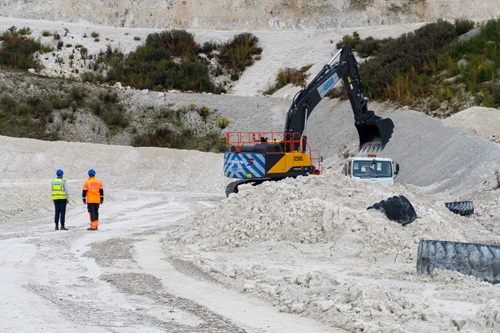
Battle says the present economic climate is challenging for the UK quarrying and aggregates industry, but this is "nothing new" for an industry that has, in the last couple of decades, had to navigate through the impact of the financial crisis in 2008, Covid-19 and latterly the macro-economic fallout from the war in Ukraine, including supply chain issues and high inflation costs. "Looking at the situation today, it is clear that certain sectors such as housebuilding are in a slowdown as a direct impact of higher interest rates set by the Bank of England to combat inflation, which in turn filters down to housebuilding demand in the market due to the higher mortgage rates for lenders. Regarding the quarrying and aggregates companies, this has meant less demand for some of their products, such as asphalt and ready-mix, which are largely dependent on a strong and healthy housebuilding market. However, the latest data suggests that commercial building continues to expand, which may (in the short term) soften the impact of the decline in housebuilding."
Battle says that despite media attention and some criticism of government spending levels for core infrastructure, civil engineering projects have remained robust, albeit the pace of growth has slowed recently. "As this sector has remained strong in the first half of 2023, primary quarries with supply chain contracts in place have seen their output remain steady, and as we track machine utilisation across both major projects and downstream primary quarries, we can see that civil engineering projects remain busy, despite delays in infrastructure timescales."
Does Battle think current demand levels are likely to change in 2024? "Listening to the two main political parties, they are both in agreement that it is paramount that there needs to be significant investment in Great Britain to drive growth and prosperity, including generating good quality and well-paid jobs. The political party that is successful in the general election next year will need to quickly spell out their plan to drive growth and explain where it will make key investments. There needs to be a structured plan for energy, with a mixture of large projects such as Sizewell C and Small Modular Reactors (SMRs), to ensure we have a reliable (secure) energy supply to meet current and future energy demand.
"However, in the short-term, we need to see a commitment to a well-funded transport policy, including backing for Road Investment Strategy (RIS) 2 and 3. This will include important projects such as Lower Thames Crossing (LTC), A303 Stonehenge tunnel and many other significant National Highways schemes aimed to connect Britain. I would also like to see the successful party commit to HS2 in full and a better focus on the overall levelling up agenda. This should include projects such as the Northern Powerhouse rail link, which will be a key investment into the future economic success of northern England."
Battle stresses that investment in core British infrastructure needs to be done in a way that will decarbonise construction activities and help to accelerate change towards diesel-free jobsites. "Quarrying and aggregates companies, supported by Volvo CE and SMT, are already working in partnership to lower the impact of CO2 by utilising net zero construction equipment machines, supported by solutions. Volvo CE has the largest range of commercially available electric construction equipment products in the market. SMT and Volvo CE are fully committed to introducing a full range of technologies and solutions to help our customers decarbonise, and the pace of this transformation is accelerating. However, SMT is also helping customers minimise their CO2 footprint with their existing fleets of diesel internal combustion engine machines, which will continue to operate for many years. It is critical that we work with customers to lower their CO2 impact across the whole lifespan of their machines, which includes how we rebuild and recycle machines at the end of their life."
Battle explains that the leading quarrying and aggregate companies are looking past some of the short-term economic uncertainties and see the climate change situation as a far greater threat to their long-term security and, therefore, something that they need to act on today, rather than wait for legislation or for the perfect solution to become available. "The real pioneers are already taking a close look at our solutions and are considering how they might need to adapt how they have worked in the past to adopt and embrace the future," he concludes.
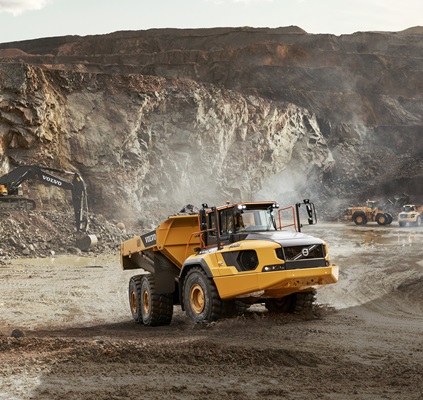
Retail sales of UK construction and earthmoving equipment bounced back in June 2023 after falling below year-on-year levels in May, according to the Construction Equipment Association (CEA) and Systematics International's construction equipment statistics exchange.
Sales in June were over 8% above those in the same month last year, including very strong sales of mini/midi excavators, the most popular product in the UK. As a result, sales in Q2 ended up at 3% above the second quarter last year.
Sales in H1 2023 reached 19,600 units, 7% ahead of the same period of last year. While the CEA notes that current sentiment in the market is still anticipating a modest downturn in sales in the second half of the year, this will be from 'record' high levels achieved in the year's first half.
Road rollers show the strongest growth at 37% above last year's levels, following very strong sales in June.
The pattern of sales on a regional basis in the UK and Northern Ireland is mixed. This year's strongest sales are still in Scotland and the South East of England, where sales remain around 30% ahead of last year's. Only three regions are seeing lower growth than last year, consisting of the North West of England (-16%), Northern Ireland (-5%) and London (-4%).
Equipment sales in Ireland are also reported in the statistics exchange. Sales in May and June 2023 were at similar levels to the same months of 2022, and sales in the first half of the year are 3% above last year's, due mainly to a very strong first quarter.
GlobalData, a leading global business intelligence consultancy, reports that the Irish construction market size was $26.2 billion in 2022. The same source projects the market to achieve an AAGR (annual average growth rate) of more than 4% during 2024-2027, assuming an improvement in the wider economy, and this will be supported by investment in the transport and electricity sectors. The rise is good news for the country's building materials producers, off-highway machine manufacturers, and machine dealers.
The leading contractors in the Irish construction market are SISK Group, P.J. Hegarty & Sons UK Ltd, Royal BAM Group NV, John Cradock Ltd, McKeon Group, Quintain Ltd, Stewart Construction, Ronan Group Real Estate, SIAC Construction Ltd, and Wills Bros Ltd. SISK Group led the market in 2022.



